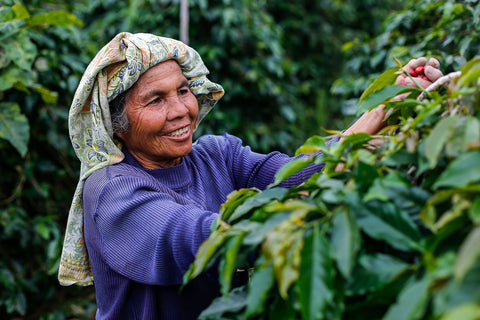Bean of the Month: Sumatra Wahana | May 2022
Brodie Wallace @ 2022-10-04 14:45:25 +1000Introducing our May Bean of the Month - Sumatra Wahana
As cuppers - the official name for professional coffee tasters - we are taught to put aside our preconceptions when we approach a coffee and judge it on its merits. This is sometimes easier said than done, and old wisdom about what coffees “should” taste like lingers in the back of your mind. Brazils taste like chocolate and nuts, Ethiopians are floral and fruity, Colombian coffees are clean, and Indonesian coffees are earthy.
Our May Bean of the Month turned all our prejudices on their head.

There was cinnamon and cocoa in the cup - maybe some nutmeg, definitely spicy, but then this jammy sweetness of plum, baked fruit and caramel. And the acidity was clean and sweet, like fresh orange! The body was creamy, but never heavy, somehow mellow and strong at the same time. Sumatran coffee, but not as we know it.
The Wahana Estate specialises in producing varietals developed in Indonesia, such as Andong Sari, Jember, Jantung, and Rasuna. Each varietal is picked and processed individually, and sold as microlots. Maintaining this crop diversity is beneficial for the local ecosystem, and provides an opportunity to experiment with processing methods to bring the best out of each type of coffee. The lot selected for our May Bean of the Month is a Rasuna varietal - a recently developed Catimor x Typica hybrid developed locally in Sumatra for its high yield, sweetness and longevity.

For this harvest, the Wahana Estate have chosen to eschew the traditional Indonesian processing practice of giling basah - wherein the coffee beans are pulped and hulled while still wet - which produces the divisively funky earthy flavours Indonesian coffee has become famous for. Instead they have taken a path more commonly associated with Brazilian and East African coffees - sun-drying the cherries onto the seeds on raised beds. This has produced an intense sweetness in the cup, which blends beautifully with the spicy cocoa notes contributed by the varietal.
Natural processing is meticulous work: the cherries must be perfectly ripe and once harvested they must be turned hourly as they dry to avoid mould developing as the sugars ferment in the fruit. Wahana Estate employs over 1000 workers to manage the planting, maintenance and harvest of their crops. The plants are shade-grown, and composted with coffee pulp and manure, to avoid the use of chemical fertilisers and maintain the integrity of the local water source.

These workers are provided with housing, electricity, water, healthcare and childcare, as Wahana Estate seeks to lead Indonesian coffee production in responsibility as well as quality. Of the 468 hectare property, 250 hectares are for coffee planting, and 30 hectares is given over to the nursery, where seedlings are grown and local farmers are able to take seeds for free in order to grow their own crop at home. The rest of the land is a mix of processing hub, accommodation and wildlife corridors, with strips of native forest cutting through the farmland.
“Wahana” means vehicle in Indonesian, and this name was chosen to reflect the ambition of the growers - to drive the coffee industry forward through a careful blend of innovation and tradition. This ambition is bearing fruit as they redefine what Sumatran coffee can be while maintaining and recognising the unique strengths of Indonesian coffee and the communities who grow it. It is special, it is delicious, and we hope you enjoy it.
- Choosing a selection results in a full page refresh.
